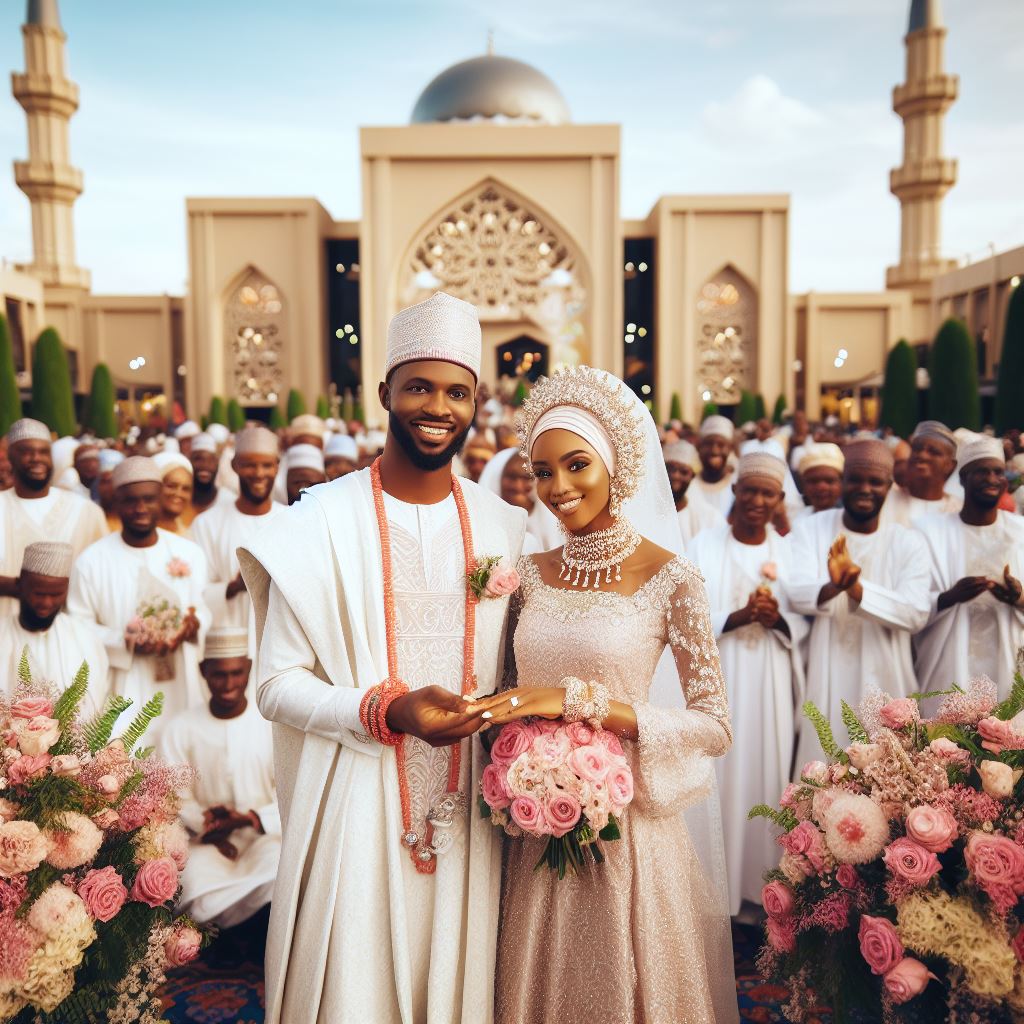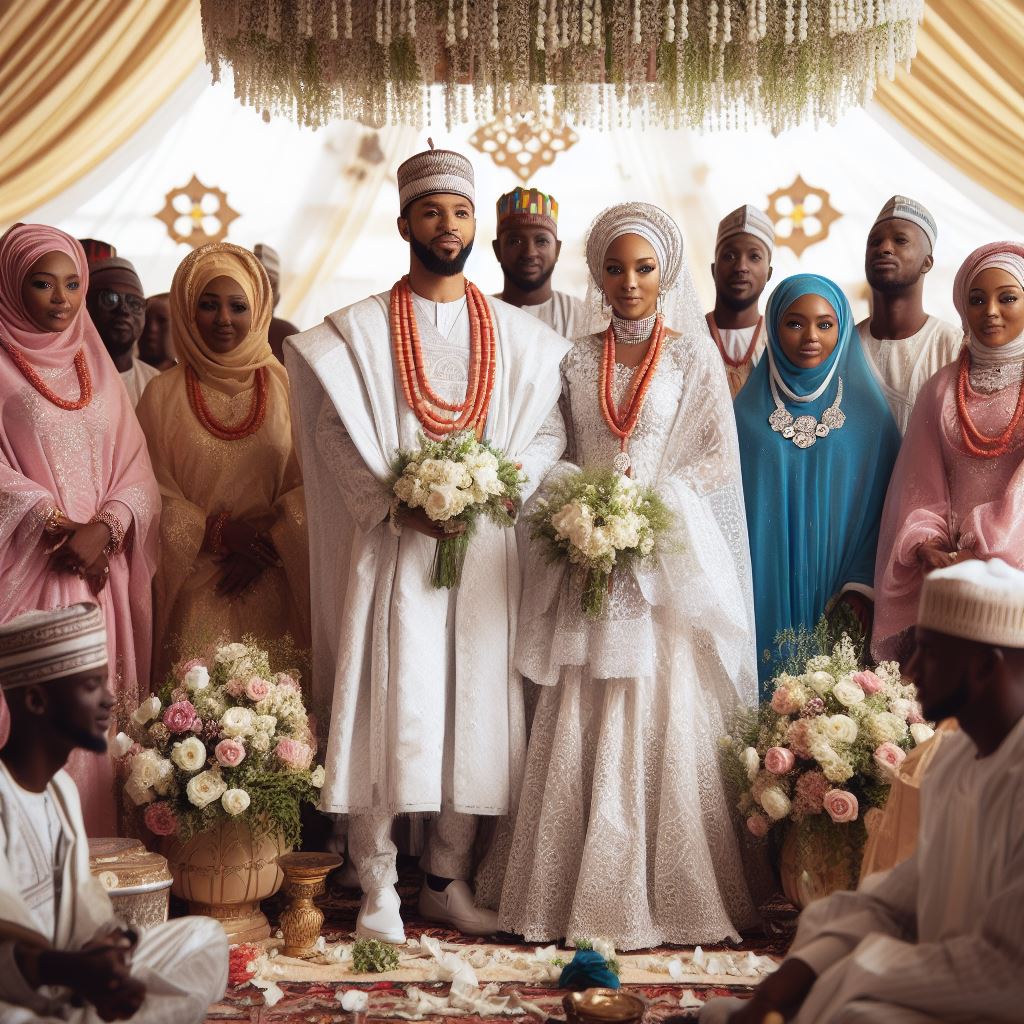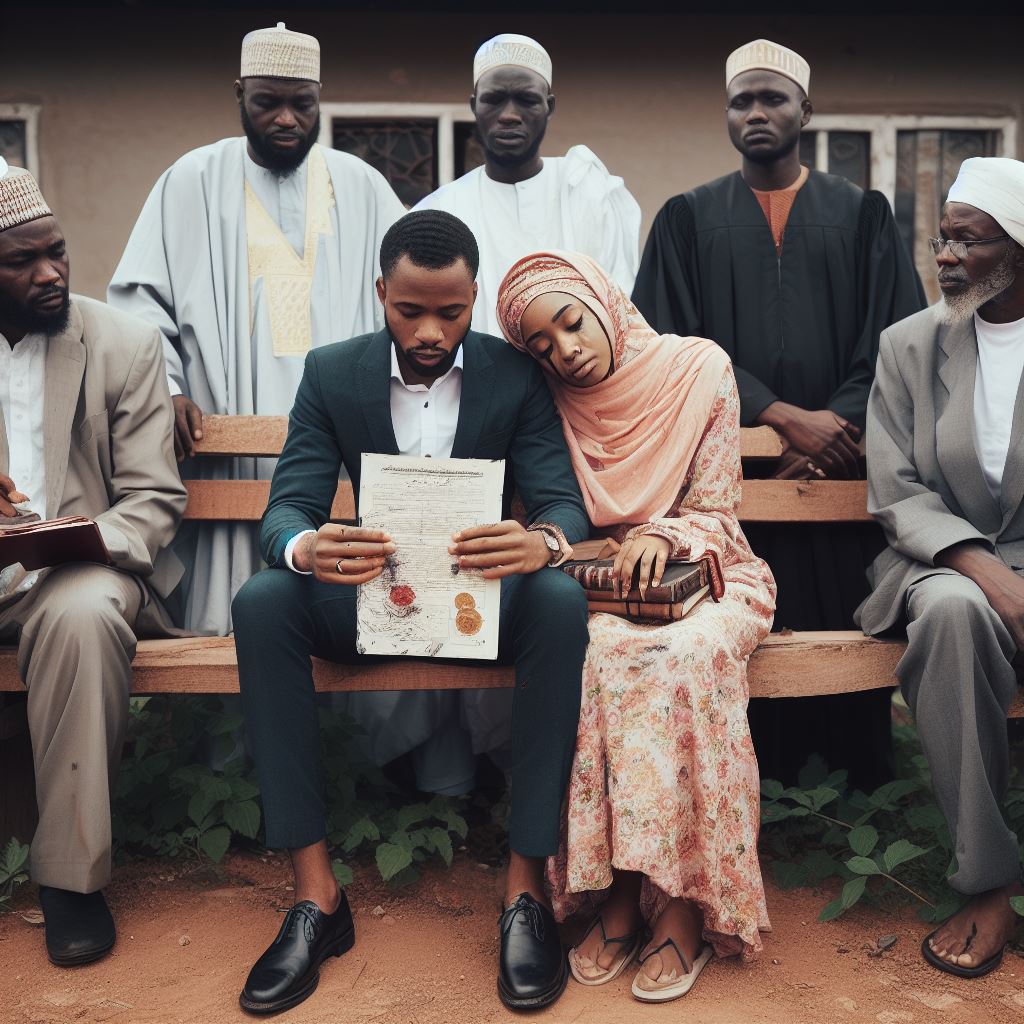Introduction
Marriage is a sacred institution in Islam, carrying immense significance for Nigerian Muslims.
As followers of the Quran, they adhere to the teachings and principles outlined in this holy book.
Understanding these aspects of marriage is crucial for maintaining strong and fulfilling relationships within their community.
The Quran serves as a comprehensive guide for all aspects of life, including marriage.
It provides wisdom, guidance, and instructions for couples to honor the institution of matrimony.
By delving into specific verses, Nigerian Muslims can gain a deeper understanding of their responsibilities and rights as spouses.
Moreover, this blog post aims to shed light on verses that address different facets of marriage, such as mutual respect, equality, communication, and resolving conflicts.
By examining these verses, Nigerian Muslims can foster healthier relationships and ultimately build a stronger society.
Basically, this post will serve as a valuable resource for Nigerian Muslims seeking guidance and inspiration in their marital lives, empowering them to create harmonious and fulfilling partnerships based on the teachings of the Quran.
Through a conscientious exploration of the Quran’s teachings on marriage, Nigerian Muslims can strive for marital bliss and strengthen their faith simultaneously.
Read: Islamic Marital Duties: A Guide for Nigerian Couples
The Concept of Marriage in Islam
Marriage as a sacred bond
Marriage holds a significant place in Islam, as it is considered a sacred bond between a man and a woman.
In the Quran, Allah describes marriage as a means of finding tranquility and comfort:
“And of His signs is that He created for you from yourselves mates that you may find tranquility in them; and He placed between you affection and mercy. Indeed, in that are signs for a people who give thought.” (Quran 30:21)
Islam emphasizes the importance of a loving and respectful relationship between spouses, built on trust and companionship.
Marriage is not merely a legal contract, but a spiritual and emotional connection with profound significance in the life of a Muslim.
It is through marriage that individuals can fulfill their physical, emotional, and spiritual needs within the boundaries set by Allah.
The Quran encourages Muslims to enter into marriage with the intention of preserving chastity and avoiding immoral relationships.
The role of marriage in creating harmony within society
In Islam, marriage serves a larger purpose beyond the individual couple, as it is seen as a means to create harmony and stability within society.
Through marriage, families are formed, and children are raised in a nurturing environment conducive to their physical, emotional, and spiritual development.
The Quran acknowledges the importance of a strong family unit and the role it plays in maintaining social order and building a righteous community:
“And We created you in pairs and made you into nations and tribes, that you may know one another. Indeed, the most noble of you in the sight of Allah is the most righteous of you. Indeed, Allah is Knowing and Acquainted.” (Quran 49:13)
Marital harmony and fulfillment are believed to have a positive ripple effect on society, promoting peace, love, and compassion.
Islam encourages Muslims to approach marriage as a means to establish strong family ties and contribute to the betterment of society.
Different types of marriages recognized in Islam
- Islam recognizes various types of marriages, each with its own specific guidelines and conditions.
- The most common form of marriage is a traditional marriage, where a man proposes to a woman with the involvement of their families, witnesses, and a marriage contract.
- Sometimes, individuals may opt for a secret marriage, which is valid in Islam if certain conditions are met, such as the presence of witnesses and the intention to make the marriage public when necessary.
- Islam also recognizes temporary marriages, known as “Mut’ah” or “Nikah Mut’ah,” which have specific conditions and time limits.
- However, it is essential to note that the concept of temporary marriage is a subject of debate and interpretation among scholars.
Generally, marriage holds immense significance in Islam as a sacred bond that fosters love, tranquility, and spiritual harmony.
It serves as a means to establish strong family ties and create a harmonious society.
Islam recognizes various types of marriages, each with its own guidelines and conditions, emphasizing the importance of mutual respect, love, and commitment within the union.
Read: From Singlehood to Married Life: A Nigerian Journey Explored
Key Quranic Verses on Marriage
Surah An-Nisa (The Women)
- Verse 4: Polygyny and its conditions
- Verse 19: The importance of consent in marriage
- Verse 21: The potential for love and mercy between spouses
The Romans – Surah Ar-Rum
- Verse 21: The divine purpose of marriage
- Verse 30: Creation of spouses as a sign from God
- Verse 21: The concept of finding peace and tranquility in marriage
Surah Az-Zumar (The Troops)
- Verse 53: God’s preservation of the institution of marriage
- Verse 10: The significance of having righteous children
Surah Al-Furqan (The Criterion)
- Verse 74: Importance of choosing a righteous spouse
- Verse 75: Maintaining fidelity and avoiding adultery
- Verse 77: The significance of a peaceful home in the afterlife
Marriage is a sacred bond in Islam, and the Quran provides key verses that guide Nigerian Muslims in their understanding and practice of this institution.
These verses highlight various aspects of marriage, from the conditions of polygyny to the importance of consent and maintaining fidelity.
They also emphasize the potential for love, mercy, peace, and tranquility between spouses. Let us explore these key Quranic verses on marriage in detail.
Surah An-Nisa (The Women)
In Surah An-Nisa (The Women), Verse 4, the Quran addresses the issue of polygyny.
It states that men are allowed to marry up to four women but on the condition of treating them equally and justly.
This verse provides guidelines for those who choose to practice polygyny, emphasizing fairness and equitable treatment towards all wives as an essential requirement.
Verse 19 of Surah An-Nisa highlights the importance of consent in marriage.
It emphasizes that women should not be forced into marriage against their will, and their consent is vital for a valid and harmonious marital relationship.
This verse emphasizes the need for mutual agreement and understanding between spouses.
Surah Ar-Rum (The Romans)
Another significant verse in Surah An-Nisa is Verse 21, which emphasizes the potential for love and mercy between spouses.
It highlights the companionship and support that marriage offers, encouraging spouses to treat each other with kindness, compassion, and respect.
This verse reminds Nigerian Muslims of the importance of fostering love and mercy within their marital relationships.
Moving on to Surah Ar-Rum (The Romans), Verse 21 highlights the divine purpose of marriage.
It states that Allah has created spouses for each other so that they may find tranquility and peace in their union.
This verse emphasizes the spiritual dimension of marriage and encourages couples to seek peace and harmony within their relationship.
Verse 30 of Surah Ar-Rum further emphasizes the creation of spouses as a sign from God.
It highlights the intricate and interconnected nature of husband and wife, emphasizing the divine wisdom in their union.
This verse encourages Nigerian Muslims to appreciate and cherish the unique bond between spouses as a reflection of Allah’s design.
Surah Az-Zumar (The Troops)
In Surah Az-Zumar (The Troops), Verse 53 emphasizes Allah’s preservation of the institution of marriage.
It reaffirms the sanctity of marriage and highlights its significance as a means of societal stability and continuity.
This verse reminds Nigerian Muslims of the divine wisdom and protection surrounding the institution of marriage.
Verse 10 of Surah Az-Zumar highlights the significance of having righteous children.
It emphasizes that children are a blessing from Allah and encourages parents to strive for righteousness so that their children may inherit excellence.
This verse underscores the importance of building a pious and virtuous family for the betterment of society.
Surah Al-Furqan (The Criterion)
Lastly, Surah Al-Furqan (The Criterion) emphasizes the importance of choosing a righteous spouse.
In Verse 74, the Quran advises believers to marry those who are righteous and faithful, emphasizing the influence a spouse can have on one’s faith and character.
This verse encourages Nigerian Muslims to prioritize shared values and piety in their search for a life partner.
Verse 75 of Surah Al-Furqan emphasizes maintaining fidelity and avoiding adultery.
It highlights the importance of marital loyalty and fidelity, reminding spouses to guard their chastity and honor.
This verse encourages Nigerian Muslims to prioritize trust and commitment within their marital relationships.
Verse 77 of Surah Al-Furqan emphasizes the significance of a peaceful home in the afterlife.
It describes the reward for those who create a peaceful and harmonious environment within their homes, promising them tranquility and contentment in the hereafter.
This verse encourages Nigerian Muslims to strive for a peaceful and loving home, knowing that it has eternal rewards.
Essentially, the Quran provides key verses that shape the understanding and practice of marriage for Nigerian Muslims.
These verses cover a range of aspects, from the conditions of polygyny to the importance of consent, love, mercy, peace, and fidelity within marriages.
By reflecting on these Quranic teachings, Nigerian Muslims can strengthen their marital relationships and strive for a harmonious and fulfilling married life.
Read: Dowry (Mahr) in Islam: Meaning and Nigerian Practices

Lessons and Applications for Nigerian Muslims
Importance of consent and mutual respect in marriages
- In Quranic teachings, marriage is a sacred bond based on consent and mutual respect.
- Partners must willingly and wholeheartedly enter into the marriage contract.
- Nigerian Muslims should emphasize the significance of obtaining consent from both parties.
- Respecting each other’s rights and opinions is crucial for a successful and harmonious marriage.
- Marital decisions should be made jointly, considering the feelings and perspectives of both spouses.
Understanding the conditions and responsibilities of polygynous marriages
- The Quran permits polygyny but imposes conditions and responsibilities on Muslims engaging in such marriages.
- Nigerian Muslims should understand the requirements, including fairness and equal treatment towards each spouse.
- It is important to ensure that the practice of polygyny does not breed injustice or favoritism within the family.
- Open communication and honesty are vital to maintaining harmony and resolving conflicts in such marriages.
- Muslims in Nigeria should approach polygyny with compassion, empathy, and a sense of justice.
Seeking love, mercy, and tranquility in marriage
- Love, mercy, and tranquility are essential elements for a successful and fulfilling marital relationship.
- Nigerian Muslims must strive to cultivate these qualities within their marriages.
- Expressing love and kindness towards one’s spouse can strengthen the bond and improve overall well-being.
- Mercy and forgiveness should be practiced, fostering a compassionate and nurturing environment.
- Creating a peaceful and tranquil atmosphere allows spouses to find solace and comfort in each other.
Nurturing righteous children and fostering a harmonious family environment
- The Quran emphasizes the importance of raising righteous children who are well-mannered and respectful.
- Nigerian Muslims should prioritize instilling Islamic values and teachings in their children.
- Parents must serve as role models, displaying righteousness, honesty, and integrity in their own lives.
- Establishing a nurturing and supportive family environment promotes the overall well-being of children.
- Encouraging open communication and mutual understanding among family members is essential.
Striving for a peaceful and loving home for eternal rewards
- The Quran encourages Muslims to strive for a peaceful and loving home to reap eternal rewards.
- Nigerian Muslims should promote a culture of peace, tolerance, and empathy within their families.
- Resolving conflicts with kindness, forgiveness, and patience leads to a more harmonious household.
- Spouses should build strong emotional connections, supporting and cherishing one another.
- A home filled with love, compassion, and tranquility becomes a source of eternal blessings for the family.
In general , the Quran provides valuable teachings on marriage for Nigerian Muslims.
It emphasizes the importance of obtaining consent and mutual respect in marriages, understanding the responsibilities of polygynous marriages, seeking love and tranquility, nurturing righteous children, and striving for a peaceful and loving home.
By adhering to these teachings, Nigerian Muslims can build strong and successful marriages that bring them closer to Allah and contribute to a thriving society.
Read: The Role of Walis in Islamic Matrimony: A Deep Dive
Conclusion
Recap of key points discussed in the blog post
In this blog post, we explored key verses from the Quran that provide guidance on marriage for Nigerian Muslims.
We discussed the importance of mutual respect, love, and companionship in a marital relationship.
The Quran emphasizes equality and partnership between spouses, with both sides having responsibilities and rights.
We also examined the significance of communication and resolving conflicts through peaceful dialogue.
The Quran encourages forgiveness, patience, and understanding in times of disagreement.
It reminds us to treat our spouses with kindness, compassion, and fairness.
Encouragement for Nigerian Muslims to study and implement the teachings of the Quran in their marriages
It is essential for Nigerian Muslims to study and understand the teachings of the Quran regarding marriage.
By doing so, they can gain knowledge and wisdom that will help them build strong and fulfilling marital relationships.
Implementing these teachings will lead to healthier and happier marriages, fostering a positive environment for both spouses and their families.
Call to reflect on the significance of Quranic guidance for a successful and fulfilling marital life
As Nigerian Muslims, it is crucial to reflect on the significance of Quranic guidance for our marital lives.
The Quran provides timeless wisdom and practical guidance on various aspects of marriage, including love, respect, communication, and conflict resolution.
By applying these teachings, we can strive for a successful, harmonious, and fulfilling marital life that aligns with our faith and values.
In a nutshell, let us make a commitment to study, understand, and implement the teachings of the Quran in our marriages.
By doing so, we can create strong foundations for our relationships and experience the blessings and happiness that come with following the divine guidance provided in the Quran.




